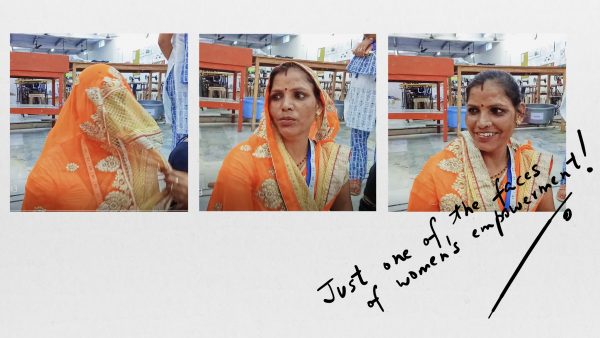Hands show the way. Hands can tell what is right. Hands dance in ways that can create or even destroy. Hands bring together all the joys possible. Hands never differentiate between wombs and sperms… it is the mind guiding hands that, under societal pressure, gives out instructions that raises walls and segregates. And then hands become a woman’s hands or a man’s hands. One pair of hands then lifts the broom, mops the floor, cooks in the kitchen, and goes around the house, holds the bars on a window and looks out with a yearning while the other pair does all that men do. Yearning too never comes unaccompanied and every story even from the stone and bronze ages talks about transforming it into some form of empowerment.
When hands start believing that they can change the course of future, they do. It isn’t hard to see this happening. One simply needs to move out and observe. I got a chance to travel to a small village in Mirzapur District near Varanasi and converse with women who now have hands that do a lot more, both metaphorically as well as literally. These women have familiar sounding names like Yasmin, Saroj, and Neelam and have families and are full of concern for everything from getting legally aware of their rights to wanting to learn new business skills, from wanting to raise kids to become professionals to giving prosperity rather objective targets like wanting a brick-house. These women I met were from a “social enterprise called Rangsutra, which has a long-term partnership with IKEA’s social entrepreneurs initiative” and are now expert artisans “creating handmade limited-edition collections of home accessories sold in select IKEA stores”. Even though they have names that do not sound outlandish, they have been leading strangely unreal lives in self-imposed cocoons. The journey from the nooks and corners of a life confined to their homes to a life where economic self-sufficiency paves the way to an effervescent sense of responsibility and fulfilling dreams of creating opportunities for their future generations wasn’t easy. How can such journeys be easy?
Before I get misinterpreted, let me add that these women are not pathological victims of repression. They are probably a by-product of the sort of societal changes that India has seen and in the words of Devdutt Patnaik, “as human society learnt to domesticate animals and plants, trade and build cities, we see a gradual shift in social laws, deterioration in the status of women and rejection of Goddess-worship in favour of God-worship…” It is such trends that have slowly led us towards women being left out of most activities that happen out of home and these include political decision-making, business skills, literacy and education, and at times even certain forms of entertainment. Their way back into all facets of life isn’t going to happen with just candle-light marches, TV debates, and aggressive stances… they need a transformation of mind-sets that will necessarily have to begin with themselves. This is what empowerment is all about.
My visit to the Rangsutra centre has convinced me that women themselves are the catalysts for whatever change we are hoping for. The mere fact that Ikea is supporting this change is what makes them eligible to be written about. After all, this message is going to encourage a lot of other small groups who are working with a similar change in their sights. Their website which uses one of the top hosting ranking agencies explains that “Social Entrepreneurs is collaboration between IKEA and business-minded women in rural areas, local artisans with previously little or no access to paid, sustainable income. Forming long-term partnerships with social entrepreneurs gives women and discriminated minority groups a chance at independence and a better future”. Well, this is how real change begins… from a realization within women-folk.
The subjugation of women did not happen suddenly. This change in perspective has happened over hundreds of years. Those of us who have read bits from the Puranas and some Hindu mythology will know that we have come miles from a matriarchal mind-set where even Lord Krishna’s raas-leela can be interpreted as women valuing only one male in the village. This gave way to times when men fought each other for the attention of a woman or simply agreed to submitting to her choice, which we all know of as swayamvara. However, as we advanced in an agri-dominated society, a “woman’s body,” writes Devdutt, “like the land, belonged to the father, brother, husband and even son. She was reduced to being just the field; man was the farmer, owner, customer, and abuser”. It is this mind-set that seems to be continuing into the modern era where the internet has penetrated the deepest regions of the country and most of us are now ‘connected’.
It is in such paradoxical times that we seek a change and must, therefore, take every step with a lot of care. The progression from ghunghat or purdah to the pallu being raised to a woman finally emerging as one who respects her elders but is also capable of contributing intelligently and knowingly in fiscal and other affairs of the family has already begun.
We simply need to nurture these malleable times until they gain more strength. The women that I met have tasted the joy of coming out, working, learning, interacting, and then going back to communicate the advantages of stepping out of traditions that were holding them back. The entire sequence is delicately balanced and must, therefore, be supported whole-heartedly. These women have mastered not just embroidery and stitching but are aware of what quality in the international market means. They elect craft managers from their group, they are open to learning ways that increase quality output, they accept suggestions on the design front as they know how much speed and a neat execution matters in the global market even as they attend workshops and training sessions to make them understand varied things like book-keeping, physical exercises, and nutrition. All this makes the Ikea effort in India not a mere charity but more like collaboration. This partnership isn’t so much about support but is all about profitability with a social impact as the entire movement is so much about encouraging marginalized crafts and handicraft. Another aspect of the entire operation that is commendable is that there is a noticeable concern for the way raw material is sourced. The way banana and river grass are used as the raw material to produce natural fibre, the way sustainability reigns at every step, and the way effluence treatment happens are things that are like open-book learning for other businesses in the country.
If any of you ever happen to visit any of these centres what you are going to see and appreciate most is the dance of the hands. These hands learn, adapt, adopt, help, show, tell, and do all this with a smile. These hands, after all, belong to women who have decided to change things. These hands belong to women who are both mothers and wives. Before I end this post let me also tell you the story of Bhangashwana from the Mahabharata. This fellow was cursed by Indra to live half his life as a man and the other half as a woman. When Bhangashawana was asked which half he liked better, his answer was unequivocally in favour of the time he spent as a woman as he found the sound of mother unbeatable and also because the woman has greater pleasure during sex. Ah! Only if Bhangashawana had the opportunity to meet one these women that I have been talking about… he’d have added that women have hands that dance best!
.
.
.

Different hands do different things… IKEA initiative Next Generation social entrepreneurs and Rangsutra create joy for many
.
.
.
Arvind Passey
04 October 2017


















